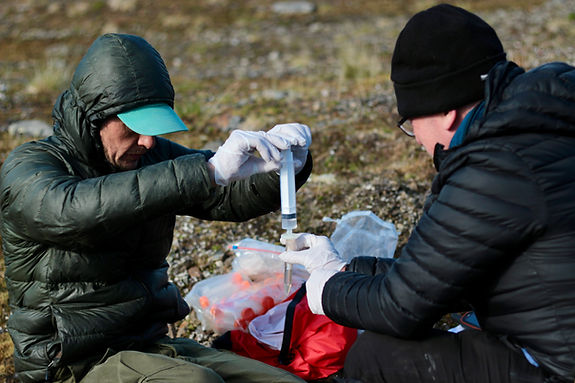Our Story
The Arctic Research Group organises and carries out scientific research expeditions in the High Arctic.
A registered UK charity, it is a non-profit, volunteer organisation.

It all started in 1975
A Windswept Idea on Kinder Scout
In the winter of 1975, a group of Mountain Rescue personnel huddled under an emergency shelter on Kinder Scout, high in Derbyshire’s Peak District. Outside, snow flurries howled across the moorland. Inside, they chatted about upcoming holidays. Amid the talk of beaches and sunburns, someone jokingly suggested, “Why not the Arctic instead?”
It was a flippant remark, but one that sparked something real. That suggestion led to Ian Frearson receiving an invitation to join a 1977 expedition to Svalbard as a surveyor.
Falling in Love with the Arctic
That first journey left a lasting mark. Ian was captivated by Svalbard’s glaciers, wildlife, and stark beauty. He described the experience as “a complete success,” one that led to twelve more Arctic expeditions—thirteen if you count a trip to Alaska. Most were to Spitsbergen, Svalbard’s largest island.
Reflecting on his many visits, Ian once said:
“I hope never to tire of witnessing the variety and splendour of this region and for this reason alone have chosen once again to return to Svalbard.”
And he never did.
Danger and Beauty in Equal Measure
Ian has always been candid about the challenges of Arctic travel.
“The ever-present dangers, from both the natural environment and the inherent and latent dangers from wildlife, will always make a visit to these regions both special and serious.”
But, he adds, the risks are more than outweighed by the Arctic’s breathtaking beauty:
“Sadly, if we want things to stay as they are, things are really going to have to change. Let us hope that future generations will have the opportunity to see and think the same way.”
From Guest Expeditions to Scientific Endeavour
After a return trip to Svalbard in 1983, Ian began to reflect on the format of the expedition, one that had balanced science with wilderness experiences for paying guests. The concept intrigued him, but his passion for science was growing stronger. He decided to form a new expedition group with a more focused mission: scientific research in the Arctic.
The Birth of the Arctic Research Group
In 1988, Ian Frearson founded the Arctic Research Group (ARG) alongside four fellow Founder Members: Richard Grant, Mike Haynes, George Shaw, and Stephen Staley.
The first official ARG expedition launched in 1989 to Svalbard, followed swiftly by a 1990 expedition that received a Rolex Award for Small Expeditions.
A Mission That Still Holds Today
From the outset, the group’s mission has remained the same:
To carry out multi-disciplinary scientific research expeditions, enabling researchers and volunteers to work together and contribute meaningfully to Arctic science.
ARG’s research has spanned a wide range of disciplines, from short-term studies to complex, multi-year projects.
Connected to the Arctic Research Community
The Arctic Research Group maintains close ties with leading research institutions including:
-
Scott Polar Research Institute
-
British Antarctic Survey
-
Norsk Polar Institute
-
Universities in the UK and internationally
These partnerships ensure ARG’s work remains relevant and aligned with the latest developments in Arctic research.
Supporting the Next Generation of Researchers
A core focus of ARG is to create affordable, high-impact expeditions that give early-career researchers the opportunity to gain hands-on field experience in the Arctic.
Expeditions are entirely volunteer-run. Members not only give their time but also contribute financially—fundraising, securing grants, and providing their own gear.
Beyond the Expedition: A Legacy of Commitment
While the expeditions themselves are often brief, they are the result of months—even years—of planning, logistics, and post-expedition work.
The dedication of ARG members speaks volumes: this is more than a research effort—it’s a shared commitment to protecting and understanding one of the world’s most extraordinary regions.
A Vision That Endures
None of this would have been possible without Ian Frearson, FRGS, whose vision and leadership gave life to the Arctic Research Group. His passion inspired the founding members and continues to inspire every expedition today.
The ARG’s past, present, and future, all rooted in that moment on Kinder Scout, stand as a testament to what can grow from a single, snow-blown idea.













